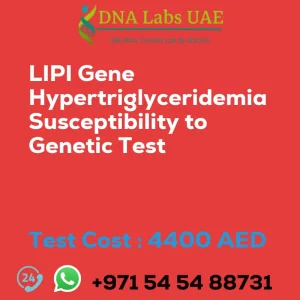SLC16A1 Gene Hyperinsulinemic hypoglycemia type 7 Genetic Test
Test Name: SLC16A1 Gene Hyperinsulinemic hypoglycemia type 7 Genetic Test
Components: Blood or Extracted DNA or One drop Blood on FTA Card
Price: 4400.0 AED
Report Delivery: 3 to 4 Weeks
Method: NGS Technology
Test Type: Metabolic Disorders
Doctor: General Physician
Test Department: Genetics
Pre Test Information: Clinical History of Patient who is going for SLC16A1 Gene Hyperinsulinemic hypoglycemia type 7 NGS Genetic DNA Test. A Genetic Counselling session to draw a pedigree chart of family members affected with Hyperinsulinemic hypoglycemia type 7.
Test Details
The SLC16A1 gene is responsible for producing a protein called monocarboxylate transporter 1 (MCT1), which is involved in transporting certain molecules, including lactate and pyruvate, across cell membranes. Mutations in the SLC16A1 gene can lead to a condition known as hyperinsulinemic hypoglycemia type 7.
Hyperinsulinemic hypoglycemia refers to a condition characterized by abnormally high levels of insulin in the blood, leading to low blood sugar levels (hypoglycemia). In type 7, the condition is caused by mutations in the SLC16A1 gene, which disrupt the normal function of MCT1. This can result in excessive insulin secretion by the pancreas, leading to hypoglycemia.
NGS (Next-Generation Sequencing) genetic testing refers to a type of genetic testing that uses advanced sequencing technologies to analyze multiple genes simultaneously. In the case of hyperinsulinemic hypoglycemia type 7, NGS genetic testing can be used to identify mutations in the SLC16A1 gene that may be responsible for the condition.
By identifying specific mutations in the SLC16A1 gene, NGS genetic testing can help diagnose hyperinsulinemic hypoglycemia type 7 and guide appropriate treatment options. Treatment for this condition typically involves managing blood sugar levels through dietary modifications, medication, and in some cases, surgical intervention.
| Test Name | SLC16A1 Gene Hyperinsulinemic hypoglycemia type 7 Genetic Test |
|---|---|
| Components | |
| Price | 4400.0 AED |
| Sample Condition | Blood or Extracted DNA or One drop Blood on FTA Card |
| Report Delivery | 3 to 4 Weeks |
| Method | NGS Technology |
| Test type | Metabolic Disorders |
| Doctor | General Physician |
| Test Department: | Genetics |
| Pre Test Information | Clinical History of Patient who is going for SLC16A1 Gene Hyperinsulinemic hypoglycemia type 7 NGS Genetic DNA Test A Genetic Counselling session to draw a pedigree chart of family members affected with Hyperinsulinemic hypoglycemia type 7 |
| Test Details |
The SLC16A1 gene is responsible for producing a protein called monocarboxylate transporter 1 (MCT1), which is involved in transporting certain molecules, including lactate and pyruvate, across cell membranes. Mutations in the SLC16A1 gene can lead to a condition known as hyperinsulinemic hypoglycemia type 7. Hyperinsulinemic hypoglycemia refers to a condition characterized by abnormally high levels of insulin in the blood, leading to low blood sugar levels (hypoglycemia). In type 7, the condition is caused by mutations in the SLC16A1 gene, which disrupt the normal function of MCT1. This can result in excessive insulin secretion by the pancreas, leading to hypoglycemia. NGS (Next-Generation Sequencing) genetic testing refers to a type of genetic testing that uses advanced sequencing technologies to analyze multiple genes simultaneously. In the case of hyperinsulinemic hypoglycemia type 7, NGS genetic testing can be used to identify mutations in the SLC16A1 gene that may be responsible for the condition. By identifying specific mutations in the SLC16A1 gene, NGS genetic testing can help diagnose hyperinsulinemic hypoglycemia type 7 and guide appropriate treatment options. Treatment for this condition typically involves managing blood sugar levels through dietary modifications, medication, and in some cases, surgical intervention. |








